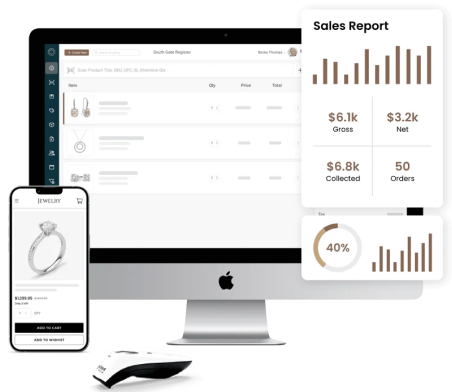Comprehensive ECOM Solution for a Jewelry Retailer


Client
Our client is a leading jewelry retailer based in the European Union, specializing in the online sale of high-quality jewelry. With a strong presence in the e-commerce sector, the client serves a wide range of customers, focusing on offering a seamless shopping experience and exceptional customer service. Their business model is centered around automation, operational efficiency, and scalability, allowing them to effectively manage sales, inventory, and employee performance. Recognized for embracing advanced technologies, the client continually strives to innovate and optimize its processes to remain competitive in the rapidly evolving online retail market.Due to confidentiality agreements, specific details about the client cannot be shared.
Challenge
The client faced the need to integrate various business processes into a unified system to enhance the management of online sales, inventory, and employee performance. The goal was to streamline operations across multiple departments, reduce costs, and improve overall efficiency.Additionally, the client aimed to strengthen fraud prevention measures and optimize payment systems to ensure smooth and secure transactions for customers. Achieving these objectives required implementing advanced technologies that could seamlessly connect business functions while ensuring scalability for future growth.

Objective
Solutions Implemented:
Modular Development and Integration
Separate Django-based modules were developed for distinct needs, including the ECOM platform, an employee engagement app, a payment and delivery management system, and a content management interface.Data Processing Optimization
Integration with a master system through RabbitMQ, caching with Redis, and catalog restructuring with Solr helped streamline data flow and improve system responsiveness.Business Process Automation
An employee motivation module was added to track task completion for performance rewards, manage reporting, and analyze sales and returns.Payment System Optimization
Enhanced integration with acquiring banks to ensure seamless payment processing and accurate receipt generation.Fraud Prevention Measures
A tagging system was introduced, categorizing users with "grey" and "black" labels, which enabled tracking and curbing fraudulent activity.A global UUID key was implemented to link all services, reducing database query volumes and simplifying data processing.Results Achieved:
Team
Technical Stack:
- Django
- PostgreSQL
- Redis
- Celery
- Solr
- RabbitMQ
- React
- Docker
- Docker Compose
- Kubernetes
- Pytest
- GitLab CI